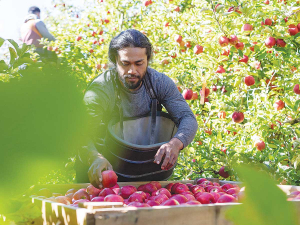Apple growers in waiting game in the wake of Gabrielle
Some apple orchardists in Hawke's Bay will have to wait up to three months to find out to what degree their trees have survived from the ravages of Cyclone Gabrielle.
 Apple and Pears NZ says urgent government assistance is need for the apple sector, which employs thousands of people all the way down that value chain. Photo Credit: Paul Sutherland Photography
Apple and Pears NZ says urgent government assistance is need for the apple sector, which employs thousands of people all the way down that value chain. Photo Credit: Paul Sutherland Photography
Chair of Apples and Pears NZ Richard Punter says there are different views on whether orchards that are impacted by water and silt can be repaired and apples planted in the same ground.
He told Hort News with the trees and debris and the bulk of the silt gone, there is still a thin layer of silt left. He says some experts believe this can be worked into the soil and things will be fine. However, others are much less optimistic. Before any decision on what to do next is made, Punter says there will have to be much greater testing of the soil.
"The problem for the 80 growers affected is that you can't insure the trees, so the damage to the orchard blocks is uninsurable," he explains. "The challenge for growers in this situation is firstly to decide if they want to try and reinstate their orchards and if they do where do they get the capital to do this."
To that end, Punter emailed government ministers last week outlining the problem and suggesting ways in which government might be able to help. The key point is a request that some sort of financial package be offered by government to bona fide growers with a good track record to enable them to get their orchards up and running again. The concept of a suspensory loan is what he's proposing. Punter points out that if the growers are not looked after, this would have a massive economic impact on the whole province.
"The 80 (apple orchards impacted) are just the ones at the beginning of a value chain that ends up in the supermarket," he told Hort News.
"There are thousands of people employed all the way down that value chain ranging from orchard staff, packhouse people and an array of service people who support the apple industry. To lose that chunk of industry out of Hawke's Bay when it was always regarded as a bright spot for our ag industry would be a huge price to pay."
Punter says they are grateful for the government assistance so far, but crunch time is coming, and it may take some orchardists up to five or more years before they can get a commercial crop off newly planted trees.
He says growers are not asking for a straight handout but for a scheme that provides some breathing space for affected orchardists and the community to get back on their feet economically.
Richard Punter says they don't have the data for Gisborne orchards yet, but that is being gathered and will be made available to government as soon as it's complete.
One of New Zealand’s longest-running pasture growth monitoring projects will continue, even as its long-time champion steps away after more than five decades of involvement.
The Insurance & Financial Services Ombudsmen Scheme (IFSO Scheme) is advising consumers to prepare for delays as insurers respond to a high volume of claims following this week's severe weather.
Additional reductions to costs for forest owners in the Emissions Trading Scheme Registry (ETS) have been announced by the Government.
Animal welfare is of paramount importance to New Zealand's dairy industry, with consumers increasingly interested in how food is produced, not just the quality of the final product.
Agriculture and Forestry Minister Todd McClay is encouraging farmers and growers to stay up to date with weather warnings and seek support should they need it.
The closure of SH2 Waioweka Gorge could result in significant delays and additional costs for freight customers around the Upper North Island, says Transporting New Zealand.

OPINION: If the hand-wringing, cravat and bow-tie wearing commentariat of a left-leaning persuasion had any influence on global markets, we'd…
OPINION: With Winston Peters playing politics with the PM's Indian FTA, all eyes will be on Labour who have the…